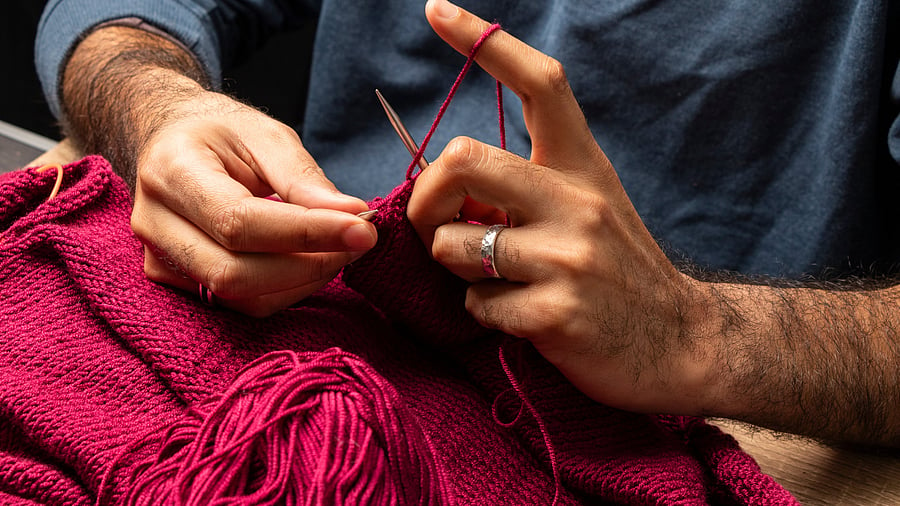
Do you remember your grandmother or mother going clickety-click with their knitting needles? Or a sister crocheting intricate flowers in multi-colours to embellish doilies or frocks? This was, of course, before brand-name woollens flooded the market, advertising men and women vacationing in winter wonderlands, draped in colourful knits. Today, however, the narrative has come full circle. Recent trends reveal that these crafts are experiencing a renaissance, with people getting hooked — literally — to crocheting, knitting, and tatting.
These crafts offer more than aesthetic pleasure. They enhance concentration and motor skills, contributing to cognitive benefits. Psychologists describe them as a form of ‘emotional processing,’ offering self-satisfaction while allowing practitioners to explore their creative potential.
“It works as a community support as well,” notes Mira Sharma, head of a small knitting centre in Noida. This is especially valuable for those living alone or feeling isolated due to infirmity or disability.
Today, knitting, crocheting, tatting, and even macramé are no longer regarded merely as frivolous, gendered pastimes. They are increasingly acknowledged as therapeutic activities for men as well. Community craft centres are burgeoning both offline and online. In Delhi, ‘Craft Addict’ in Vasant Kunj offers embroidery, crocheting, and other crafts as core activities. Chennai hosts Sandy’s Knots and Needles in Kallikuppam, specialising in training services and customised crochet products. Mumbai’s Crochetkari in Kanjurmarg East focuses on crochet work. Online coaching classes for crochet also operate from Srinagar, Mumbai, Jamnagar, and Kolkata, framing it as an eco-friendly, sustainable creative pursuit.
There is no gender barrier. Men are breaking the mould, while children are encouraged to take up these crafts to enhance motor skills, social development, and cognitive function, as well as hand-eye coordination.
Radha Matka, a homemaker, delights in cashmere wool. Rather than buying ready-made items, she scours South Delhi’s street markets for materials and reworks them into her own crochet creations.
For women, these crafts have long been an organised activity, encompassing kantha, crochet, tatting, or knitting, allowing participants to unburden personal problems and bond with their ‘yarn mates.’ The dexterity of fingers in motion facilitates healthy social interaction, and these activities also present economic opportunities. Products are often sold through welfare organisations and orphanages.
For men, however, yarn sessions remain a relatively new frontier.
“When Srinagar was shut down, I used to watch my mother with knitting needles and my sister with crochet needles. The yarn balls spinning around them fascinated me. Curiosity and boredom led me to explore it, and soon I mastered the pearl-and-knit language. My family dismissed it as a womanly chore, inappropriate for boys,” recalls Imran. Today, he runs a small but successful business in Srinagar, selling his creations.
“Everyone should have a hobby as an outlet. Even men benefit from productive pastimes like gardening, sewing, stitching, crocheting, and knitting,” says Gyanendra Mallik, an estate manager in Jammu. “I make caps and mufflers for poor children in my neighbourhood and teach them knitting and crochet. The repetitive motions act like meditation, creating calmness and a sense of well-being.”
Sahil Bacchera from Mumbai began knitting in his mid-twenties. “It helped me through the pandemic and kept me calm and occupied. Spending long hours at home didn’t become a problem,” he says.
Rahul Jadav, a 33-year-old content creator in Mumbai, taught himself crochet via YouTube while living alone. “The satisfaction of creating something tangible felt immensely rewarding. Do-it-yourself knitting kits are in high demand today. It’s an excellent way to cope with anxiety, stay mindful, and manage restlessness.”
Joining craft classes or groups is increasingly popular among men in the West, too, offering social connection and creative engagement. In Seattle, some cafés host bi-weekly ‘yarn therapy’ sessions over coffee. “Meeting like-minded people is inspiring, allows learning new skills, enhances hand-eye coordination, and provides a great socialising opportunity,” says Sean Mill.
Even prisons and rehabilitation centres in India and abroad incorporate group ‘yarning’ as therapy, helping inmates combat lethargy and depression. Participants create crochet toys, hats, and other fanciful items for small children, blending creativity with community service.